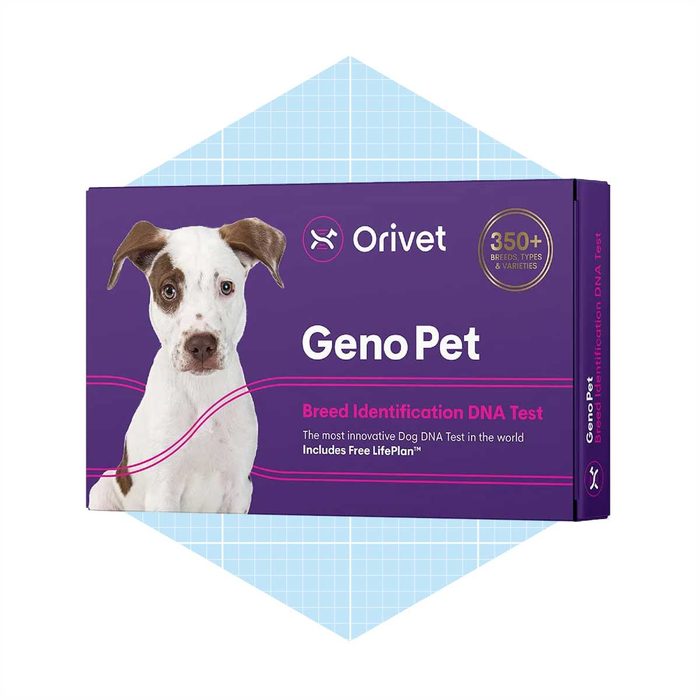via merchant
via merchant
Pros:
-
One of the few tests on the market that pinpoints substance intolerance
-
Tests for 380 common pet food ingredients and environmental factors
-
Easy to use (hair testing vs saliva swab), with fast results
-
Can be used with cats too
Cons:
-
On the pricey side
-
Some users say results are inconsistent
-
Does not provide breed identification or genetic testing results
If your pet is chronically scratching his coat or chewing his paws—or if he has digestive problems that you can’t resolve—chances are he’s intolerant to something he’s eating or something in the environment. Unlike saliva swab tests, 5Strands tests via pet hair, which you collect and send in. Within 10 days, online results show your dog’s intolerances to common pet food ingredients, as well as intolerances to grass, chemicals and other substances (be sure you’re using a pet-safe pesticide).
Several five-star reviewers refer to this test as a life-saver. Brooke LeMay calls it a game changer: “After spending a ton of money treating her unknown intolerances we decided to look into a way to test them so we could care for her better and help her itchiness…it turns out our girl was intolerant to some of the ingredients in her dog food,” she says.
“She also struggled with some environmental factors such as grass and ants. These intolerances were causing her rashes and itchiness which is no longer a problem. We’ve switched her to a food that was recommended by the veterinarian nutritionist through 5strands and she is doing wonderful! No more monthly rashes, vet visits or bills!”
What to Consider When Buying Dog DNA Tests
Accuracy of Results
When investing in a dog DNA test, accuracy is a top priority. Dr. Amanda Chambers, a veterinarian at Embrace Pet Insurance, emphasizes that not all tests are created equal. “The ones I trust are Wisdom Panel and Embark, both of which boast accuracy rates of 98-99%. DNA tests that test for fewer genetic markers will be less accurate,” she explains. To ensure you receive reliable results, opt for a test that analyzes a broad range of genetic markers and has been validated by scientific research.
Breed Identification
Understanding your dog’s breed composition can be fascinating, especially for mixed-breed owners. High-quality DNA tests provide a detailed breakdown of breed ancestry, sometimes even offering a family tree of your pup’s lineage. Dr. Chambers notes that breed identification is more reliable when a test has access to a comprehensive genetic database. “Some at-home tests are not as accurate as others, which can lead to misleading results. If you’re just curious about your dog’s breed, a lower-tier test may suffice, but if accuracy matters, it’s worth paying extra for a reputable brand.
Health Screening
A key advantage of dog DNA testing is its ability to detect genetic health risks. “A quality DNA test can detect the presence of certain genes that may predispose a pet to develop conditions such as Degenerative Myelopathy, Dilated Cardiomyopathy or MDR1 drug sensitivity,” says Dr. Chambers. However, she cautions that a positive result doesn’t guarantee a dog will develop the condition. “The presence of a certain gene does not always mean a pet will develop the disorder; it just means they are at a higher risk. Owners should reach out to their veterinarian if they have questions after receiving the results.”
Some tests also provide insights into carrier status, which can be valuable for breeders concerned about reproductive health. Additionally, a few premium options include lifestyle recommendations based on genetic data, such as diet and exercise suggestions tailored to your pet’s unique needs.
Ease of Use
Most dog DNA tests are designed for at-home use and involve collecting a saliva sample using a cheek swab. Choosing a test with clear instructions can make the process smoother. While at-home kits typically rely on saliva samples, some veterinary clinics, like Dr. Chambers’, offer blood-based DNA testing, which may yield more concentrated results. “Both can be accurate, but a blood sample is just more concentrated with your pet’s DNA,” she explains.
Turnaround Time
The processing speed of DNA tests varies by brand. Some companies provide results in as little as two weeks, while others may take up to a month. If you’re eager to get answers quickly, check the estimated turnaround time before purchasing. Additionally, many tests offer digital access to results, making it easy to review findings on your phone or computer.
Customer Support
A reliable DNA testing company should offer strong customer support, including assistance with interpreting results. Some brands even provide access to veterinary consultations. “If you have concerns about genetic health risks, consult your veterinarian to understand what the results mean for your dog’s well-being,” Dr. Chambers advises.
Extra Features
Beyond breed identification and health screening, some dog DNA tests include bonus features like a relative finder, which can help you connect with dogs that share DNA with your pet. Others offer behavioral insights, predicting temperament traits based on genetic markers. While these extras may not be essential, they can add value to your testing experience.
Return Policy and Guarantees
Before purchasing, check the company’s return policy and satisfaction guarantee. Some brands offer money-back guarantees if results are inconclusive or fail to meet expectations. Additionally, certain tests provide ongoing updates, allowing you to receive new findings as the company’s database expands.
Final Thoughts
A dog DNA test can provide valuable insights into your pet’s breed, ancestry, and potential health risks. To make the most of your purchase, choose a reputable brand with a strong track record for accuracy and customer support. As Dr. Chambers advises, “It’s best to pay a little extra for a more reliable test if you’re looking to screen for genetic disorders. Even the higher-quality tests can be purchased for at-home use.” By considering these factors, you can ensure you’re making an informed decision that benefits both you and your furry friend.
Why You Should Trust Us
This article was written by Elizabeth Heath, a travel, lifestyle, and home improvement writer based in rural Umbria, Italy. Elizabeth’s work has been featured in The Washington Post, Travel + Leisure, Reader’s Digest, TripSavvy and more. Elizabeth regularly covers pet-related topics for Family Handyman and brings a keen eye for detail and research to her work.
To ensure accuracy and expert-backed advice, this guide includes insights from Dr. Amanda Chambers, a veterinarian at Embrace Pet Insurance. Dr. Chambers is a small animal general practitioner with a Doctor of Veterinary Medicine degree from the University of Missouri. She provided expert commentary on the accuracy, health screening capabilities and potential limitations of dog DNA tests.
Additionally, Paul Rankin, Content Updates Editor at Family Handyman, updated and contributed research to this article. Paul also writes for Reader’s Digest, Bob Vila and Taste of Home, and has been writing shopping guides since 2021.,
With a combination of hands-on expertise, thorough research and professional insights, this guide provides trustworthy recommendations to help you choose the best dog DNA test for your furry friend.
How We Found the Best Dog DNA Test Kit
To identify the best dog DNA test kits, we evaluated top options based on accuracy, breed identification, genetic health screening, ease of use and additional features. We prioritized tests with large breed databases, a high number of genetic markers and reliable scientific validation to ensure precise results.
We also considered user experience, including sample collection methods, turnaround times, result clarity and customer support. Kits that offered comprehensive health insights, ancestry breakdowns and extra features like relative matching stood out among the competition. Our recommendations reflect a balance of accuracy, value and ease of use to help pet owners make informed decisions.
FAQs
Which DNA test for dogs is most accurate?
Wisdom Panel and Embark are widely regarded as the most accurate dog DNA test kits, with reported accuracy rates of 98-99%. They both use extensive breed databases and analyze thousands of genetic markers to provide detailed ancestry and health insights.
Is Wisdom or Embark more accurate?
Both Wisdom Panel and Embark offer highly accurate results, but Embark tests for more genetic markers (over 200,000 compared to Wisdom Panel’s 100,000+), making it slightly more comprehensive. However, both are excellent choices, and the best option depends on your needs. Embark excels in health screening, while Wisdom Panel is often faster and more affordable.
Do dog DNA tests actually work?
Dog DNA test kits claim a degree of accuracy as high as 98%. But some experts contend that because the tests and testing process is not regulated or peer-reviewed, the results are not necessarily reliable. Results related to genetic mutations and potential diseases and disorders may be accurate and helpful but are best interpreted by a veterinarian.
For identifying a mixed dog’s breed makeup, DNA tests will either confirm what a dog owner already suspects or upend their ideas of their dog’s genetic makeup—which is why a lot of people question the accuracy of the results.
Our final take? The best dog DNA tests can provide fun breed information for the curious dog owner and can alert you to potential health issues with your pet. But they don’t replace veterinary care, and of course, the results won’t affect how much you love your pooch!
Craving more paw-some content? Get hilarious videos, heartwarming stories and editor-vetted product recommendations for every type of pet delivered right to your inbox. Sign up for The Scoop newsletter.























